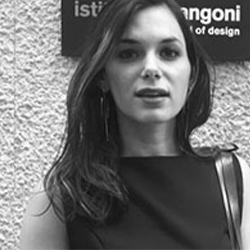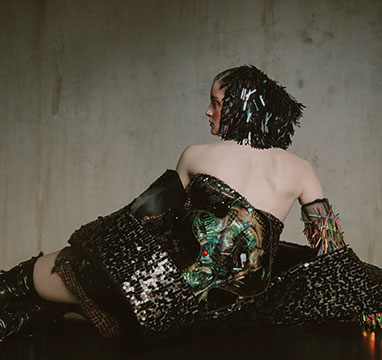- Fashion Courses
- Design Courses
- Art Courses
- Fragrances & Cosmetics Courses
- Courses for Professionals
- Short Courses
- Schools
- Admission
- Maze35 Magazine
- Newsroom
- I'M Alumni
- Careers & Industry Relations
- University Partnerships
- Get in touch

Interior Design
Participants who successfully complete this programme will be awarded with a Master Degree. Recognised by MUR (Italian Ministry of University and Research) participants will obtain 60 CFA (crediti formativi accademici) equivalent to 60 ECTS credits.
These full time postgraduate level courses are specialised programmes that support participants’ careers the design industries. They are designed for those who have already acquired specific skills in the appropriate area at undergraduate level, or for industry professionals who wish to deepen their knowledge of a specific subject area in design.
Furnishings, fabrics, textures and colours, experts in designing and translating style for living space or luxury residences work with all aspects of interior design, while positively managing client relations throughout the design project.
This 15-month course (London) or 9-month course (Milano) (including placement) is for individuals looking to challenge the world of interiors, with particular attention to the concept of luxury interiors and new aesthetics. At postgraduate level participants will already have experience in design or technical project planning in order to successfully follow the course components in creative research, home décor design, professional project development, and business preparation. Working with different materials participants are able to make practical and accurate design choices, considering the durability of surfaces in areas that are exposed to high usage, or simply switching materials to create various ‘zones’ within a space that reflects a different styl or feel. Participants learn how to combine technical aspects in layout, material choices and technology, with contemporary decoration and design elements, translating the ‘identity’ of a fashion brand, business, or individual, into a sophisticated project within the home collection sector. Experimentation with contemporary interiors is encouraged; by analysing the current discipline participants learn how to challenge traditional design styles, and take risks with innovative new proposals. They look at new attitudes in the industry that are evolving today including influences in sustainability and innovative new materials and technologies. Throughout the course participants manage the development of complex projects coordinating fabrics, colours, patterns and furnishings in harmony with both contemporary trends, and client needs using advanced technical design skills (CAD). They work on the interior design of living spaces within domestic settings, choosing furniture and styles for public spaces in hotels and restaurants as well as yacht interiors, and create design proposals that represent the leading companies of fashion and luxury décor. The course syllabus is strongly oriented towards the working relationship between the designer and the client; the ability to negotiate design style proposals, or overcome problems, requires client involvement in every step of the design process. Communication skills further provide a professional approach in the presentation of ideas to businesses and new clients while a final graduation showcase event gives participants the opportunity to showcase their work and build a network of contacts within the industry.
- Design for residential spaces
- Client expectations and brief
- The luxury industry in design and interiors
- Professional portfolio
- Innovative materials and surfaces
- Illustration and colour techniques
- CAD design 3D rendering
- Fashion influence in home collection
- Creative research methods
- Collection development manager
- Interior designer
- Illustrator
- Materials researcher/trend forecaste
- Collection development manager
- Interior designer
- Illustrator
- Materials researcher/trend forecaste
Validated by Regent’s University London
For further information click here
The programme structure ensures that students have the opportunity to develop as responsible, global citizens through contemporary interior design practice, evidenced through a well-constructed, industry relevant curriculum.
The MA programme is delivered through a highly qualified academic and studio practitioner team in addition to invited Industry mentors. Students also have the opportunity to participate in global collaborative projects within their specialised fields of study.
The MA Interior Design programme combines theoretical approaches with practical investigations through a dialogue between theory and practice. The programme provides students with a highly informed and broad academic learning environment, challenging design ethics, research and practice on a global level.
Throughout the 15 month programme, students will engage in experimental and practical design strategies, considering new and emerging design thinking scenarios within contemporary interior design practice. Students are also encouraged to assess the role of contemporary interior design practice and the role of the interior designer as a whole within an ever-changing, complex design environment.
Each unit is delivered through a series of lectures, tutorials, seminars and field trips.
In addition, to support the students overall learning experience,specialist support is provided by design technicians in the Design Lab, Digital Lab, Material Lab and Photography studio.
- To develop a critical awareness of key theories and practices within contemporary interior design, considering ethical approaches towards new and emerging design scenarios.
- The articulation of complex and innovative ideas, considering environmental, social, economic and political impacts.
- Working collaboratively within peer groups to formulate, design and test new, theories, processes and practice.
- Professional development within the field of contemporary interior design practice, through understanding the complexities within the role of interior design in the 21st
- Problem analysis and critical problem-solving scenarios within a client project brief.
- Research, analysis, reflection and testing design scenarios through a theory or practice-based dissertation.
- New Aesthetics
- Contextual and Cultural Studies
- Brand Experience
- Research Methods
- Industry Placement
- Creative Design Project
- Dissertation
- Become a professional interior designer
- Establish their own design practice
- Collaborate with other design practitioners and architects
- Provide professional CAD detailing, 3D rendering and 3D prototyping skills
- Develop interior design proposals for global charities, social enterprises and NGO’s
- Undertake critical research within interior design thinking systems and practice
- Progress further onto PhD or MPhil academic programmes
- Become a professional interior designer
- Establish their own design practice
- Collaborate with other design practitioners and architects
- Provide professional CAD detailing, 3D rendering and 3D prototyping skills
- Develop interior design proposals for global charities, social enterprises and NGO’s
- Undertake critical research within interior design thinking systems and practice
- Progress further onto PhD or MPhil academic programmes
Inspiring and supporting students while helping them grow their skills, Mentors are a go-to person for future fashion, design & art talents.
Master of Arts accreditated by the Ministry of Education and the Commission for Academic Accreditation (CAA).
The Master Interior Design course focuses on exploring an aesthetic language based on the interpretation of emerging trends and decorative and lifestyle aspects, analyzing the material and textile components and lighting, necessary to define residential spaces, as well as commercial spaces for retail or spaces for luxury hospitality. Students are directed to the understanding of the research methodology essential to know their own cultural identity, the themes of wellness as the latest frontier luxury, sustainability and technological disruption meant as the key drivers of change reshaping space planning, interior design and architecture.
Upon successful completion of the course, students will acquire essential skills and project management techniques, with a special focus on the most relevant aspects of planning an interior design, along with classes dedicated to lighting design as well as upholstery materials and fabrics, all of which considered essential notions to successfully manage an interior design project. Furthemore, research methods are key in the initial approach and analysis of international trends, supported also by the acquired notions in the history of interiors. The technical planning representation and the project visual identity is also essential and aided by specific design software learning.
The professional approach consists in providing the tools with the technical representation and methodology applied to the projects assigned by the company. Furthermore, students explore different types of projects, addressing simulated briefs assigned by companies. During the course, they will also analyze different takes on interior design, such as residential, commercial (retail design) and exhibition spaces, acquiring the ability to translate the identity of brands and their philosophy into a wide range of environments.
Participants develop the capability to develop strategies involved in the planning of public spaces on a large scale, and interiors such as Hotellerie, residential complexes, museuma and theatre spaces. This type of interiors reflect contemporary society and the ongoing search for “beauty”, comfort, and well being which translates in aesthetic codes and trends, all culminating in a precise and strategic selection of upholstery fabrics, as well as in the chromatic and stylistic choices. The search and experimentation of new technologies are essential part of the course, such as lighting design, home automation, applied digital resources, and design solutions for contract companies. Participants acquire a managerial ability to relate between the company and the client needs, as to manage all aspects of an interior design project; they will also experience working closely with partners companies within the assigned projects, learning how to relate with the professional reality.
- New aesthetic languages for Interiors
- Analyze and interpret international trends
- Understand and command technical aspects within interior projects
- Innovation and technological solutions
- Interpret and translate the client identity into the assigned project.
- Manage the relationship between client and production needs.
The enrollment fee is due every year
APPLY NOW- Project designer
- Interior Designer
- Retail Designer Manager in Interior Design Showroom
- Contract Department Manager
- Contract Manager for Hotellerie industry
- Art Director Product Manager
- Project designer
- Interior Designer
- Retail Designer Manager in Interior Design Showroom
- Contract Department Manager
- Contract Manager for Hotellerie industry
- Art Director Product Manager











.jpg)


